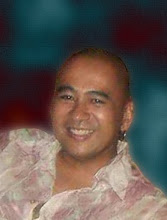
CORN TO CHICKENS
Like many Vajrayana masters, Ratu used all kinds of skilful means to introduce his students to Nature of Mind. In his compassionate desire to teach his students to experience the truth in their hearts, rather than an intellectual grasp of Lord Buddha's teachings, he often said shocking, funny or irreverent things that evoked an emotional response or drove all thought from one's mind to reveal a truth or obstacle in one's practice.
Often my initial revelations were very painful because everything felt so real to my untrained mind and clouded View. But I always felt safe, loved, protected, and much later, grateful for what Ratu helped me see in myself. In many ways he was showing me the First Noble Truth, that we are all in suffering - including myself! Once I began to accept that, he could teach me different methods to come out of samsara.
Following are some personal aphorisms I learned from Ratu to deal with life's problematic situations:
"Give gold to those who appreciate gold, and corn to chickens."
I think this saying comes from Bali, the spiritual home of our lineage. "Casting pearls before swine" is probably the closest English equivalent. What this means is to value your own kindness/compassion and practice generosity with awareness.
In my pre-dharma experience I was constantly hurt by people abusing my generosity. As a "good" Catholic, I was taught to be considerate, generous and kind - basically to give "gold" to everyone. However, I often found myself being used, taken for granted, and sometimes even judged for being stupid and weak.
Ratu taught me to take responsibility for my actions. He told me feeding gold to a chicken is useless. Similarly, a person who has never experienced the "gold" of common courtesy or kindness will not appreciate it, and even what one may consider as the smallest gesture of common decency is usually enough to satisfy them. In reality they don't expect any more or any less. Therefore to feel guilty by not going that extra mile for someone who doesn't even appreciate it is a waste and sometimes counter-productive, since they may judge and even resent you for it.
The important thing is to be totally aware - to see a person or situation clearly without any personal interest and act from that clarity of mind. If you feel that a person is trying to use you, give them only enough as you are willing to give. This is being selfishly wise.
The important thing is to be totally aware - to see a person or situation clearly without any personal interest and act from that clarity of mind. If you feel that a person is trying to use you, give them only enough as you are willing to give. This is being selfishly wise.
"Would you rather be right or happy?"
I remember this one when I feel frustrated or overcome with self righteousness. One evening I was at a dinner party and the conversation turned to the subject of romance. I listened quietly for a while, saddened by the fact that some of these guests had a very superficial view of love. I decided to present a different viewpoint from a Buddhist perspective and people began to ask me questions.
I remember this one when I feel frustrated or overcome with self righteousness. One evening I was at a dinner party and the conversation turned to the subject of romance. I listened quietly for a while, saddened by the fact that some of these guests had a very superficial view of love. I decided to present a different viewpoint from a Buddhist perspective and people began to ask me questions.
People were genuinely interested, except for one person who kept asking me an endless stream of cynical questions. At first I answered him to the best of my ability, but began to get frustrated because all he wanted was proof and wouldn't let up. I could see he wanted to believe what his heart knew to be true, but he wasn't willing to simply surrender and it didn't matter what I said, he had a response for everything. Our conversation quickly degenerated into a philosphical debate and discussion on semantics. A thought crossed my mind, that maybe I was paying karma for being exactly the same with Ratu and laughed to myself.
In the end I said, "Look, there's an old saying; 'Would you rather be right or happy?'. I could prove to you that what you are saying is bullshit, and we could debate till the sun goes down. What would it solve? I'd rather be happy! I don't have to prove anything to you; I really don't care what you think. " Then I smiled and walked away. He ended up approaching me later and we went out for a beer.
What I learned is that sometimes when you win, you lose - even if you are right. This saying is a great antidote to quelling one's pride and developing the humility to simply let go.






